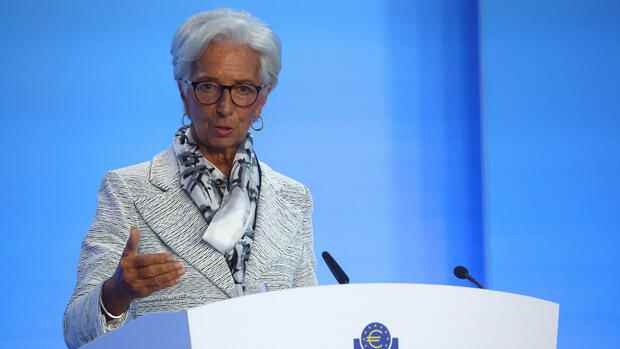The President of the European Central Bank admitted errors in the inflation forecast.
(Photo: Reuters)
Frankfurt Christine Lagarde, President of the European Central Bank (ECB), sees crucial deficits in the euro area. So far, these have prevented the euro from playing a role similar to that of the US dollar. She said that at the “Frankfurt Forum on US-European GeoEconomics”, an event organized by the US think tank Atlantic Council and the non-partisan Atlantic Bridge.
She sees three conditions for a world leading reserve currency. According to Lagarde, two of them, a large economic area as a basis and stable institutions, are given in the euro area. In the third condition, Lagarde sees the US at an advantage: a common capital market.
The head of the ECB complained: “We have good capital markets here, but no real capital markets union.” She emphasized that the rules and institutions had to be standardized even more. At the same time, however, she admitted: “The strength of the US market is US government bonds. On the other hand, we have not yet issued any joint bonds.”
The furthest step so far towards mutualisation is the euro bonds to finance the reconstruction after the Covid pandemic. From their point of view, as long as the euro capital market remains inconsistent, the euro will remain number two behind the dollar.
Top jobs of the day
Find the best jobs now and
be notified by email.
ECB wants to prevent excessive bond fragmentation
Lagarde defended the new TPI (Transmission Protection Instrument) at the event. The aim of the instrument is to prevent excessive fragmentation of the euro area through targeted purchases of bonds from individual countries.
With its second rate hike in September, the ECB made significant gains of 0.75 percentage points.
(Photo: dpa)
She explained that political aspects also play a role in assessing the financial sustainability of a state whose bonds are purchased under TPI. From their point of view, however, it is possible to avoid unilateral decisions through the diversity of voices in the ECB Council, in which the heads of national central banks from the euro area are also represented.
In addition, the ECB will also take into account analyzes from other institutions such as the International Monetary Fund (IMF). When asked whether it would not be better for the ECB’s independence to leave these political issues entirely to the political institutions, she replied: “It is crucial for our independence that we make the decisions ourselves.”
Lagarde: Underestimated inflation
Lagarde also declared that she would continue her rate hike course in the fight against inflation: “We have to bring inflation back to two percent in the medium term and we will do what we have to do, namely raise interest rates further in the next few meetings.”
If the central bank doesn’t do this, it would hit the economy much harder. “Our primary goal is not to reduce growth,” she said. “Our primary goal is price stability.” The ECB must achieve that. The central bank initiated the turnaround in interest rates in July and raised the key rates for the first time since 2011. Key interest rates were increased by 0.50 percentage points.
>> Read here: Leading institutes expect recession and rising inflation in 2023
With its second rate hike in September, it increased even more significantly by 0.75 percentage points: the key interest rate is now 1.25 percent. The so-called deposit rate, which is currently the relevant interest rate on the financial markets, is now 0.75 percent.
Lagarde admitted that the ECB initially underestimated inflation in its forecasts. But she added, “This has happened to almost all forecasters, maybe because we all use the same models.”
In the euro area, 60 percent of the prices are driven by expensive energy; in the USA, this share is only about half as high. The task now is to prevent inflation from becoming entrenched. Lagarde said: “People sitting around the salary negotiation table need to know that inflation is returning to its 2% target over the medium term.”
More: Inflation, bonds, alternative assets: that’s what drives the investment professionals of the insurers.
